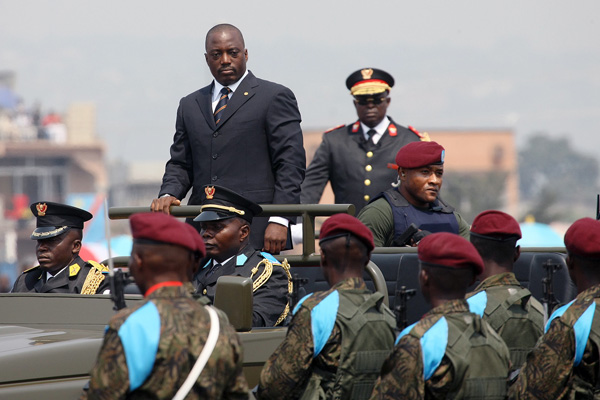
Congolese President Joseph Kabila and Rwandan President Paul Kagame held a one-on-one meeting last Sunday to discuss the recent deterioration of security along the border between their two countries. The presidents, with the backing of the regional International Conference of the Great Lakes Region, or ICGLR, agreed in principal to a number of steps to resolve the crisis in eastern Congo, including the creation of a neutral international force that would patrol their borders and act as a counter force against militias operating in the area, such as the M23, the FDLR, and any other destabilizing forces. Last week, the M23 made significant advances on key transit towns along the borders between Congo, Rwanda, and Uganda, some of which are areas known for rich mineral resources. The capture of these towns has caused further insecurity within the region and led to the mass displacement of thousands of Congolese civilians.
While the international community welcomes cooperation and collaboration between the two former enemies, the details of the Rwanda-Congo agreement remain in question. As of now, it is not certain which countries will supply troops to the patrol force and who will fund it. Civil society members whose advocacy was instrumental to advancing the concept of an international force said several countries in the region offered to provide troops, though those details have not been made public yet. “At a follow up meeting scheduled on August 7-8 in Nairobi, heads of states will decide which troops will be launched,” North Kivu civil society chairman Thomas d’Aquin Muiti told Enough. The African Union has also publicly supported this agreement and has stated that it is willing to contribute to the force.
Many Congolese as well as members of the international community remain skeptical as to what this agreement will actually achieve. Since the leak of details contained in the addendum of the latest U.N. Group of Experts report, the Rwandan government has been under scrutiny from both the international community as well as the Congolese government alleging that Rwanda is providing troops and equipment to the M23 rebels. While the Rwandan government has repeatedly denied these allegations, the evidence presented by the group of experts puts them in a difficult position with their international allies, including the United States. In light of this, some sources on the ground suggested they believe the Rwandan government made the agreement because they expected that few countries, if any, would be willing to supply troops for the patrol force. Some Enough sources expressed doubt about the impact such a force could even have, given that there is already an international presence on the ground through the U.N.’s mission in the Congo, or MONUSCO, and three Rwanda battalions stationed in eastern Congo for over a year. MONUSCO is one of the world’s largest U.N. peacekeeping missions, with more than 17,000 troops currently stationed in the Congo. However, it has been unsuccessful in curbing the violence in the region and has done little to protect the Congolese civilian population.
The Enough Project encourages continued cooperation from both the Congolese and Rwandan governments toward ending the violent activities of the M23, FDLR, and other illegal armed groups operating in eastern Congo. However, finding a solution to the conflict will also require assertive action from all regional parties.
Fidel Bafilemba and Sarah Zingg Wimmer contributed to this post.
Photo: Congolese President Joseph Kabila (AP)

